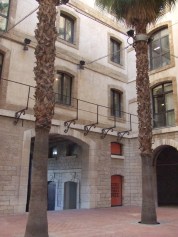Our last big trip was to Marseille, France to study poverty-stricken areas called the French Banlieues which exist in the suburbs and contrast that to the United States ghettos that exist in the inner city. Before we left we read several articles about the reasons why the riots in 2005 all over France did not gain a strong fight in Marseille with many of the young people. The main reason for this is because many children of immigrants see themselves as Marseillians, identifying themselves with the city rather than their homeland. With this unique identification it creates an irreplaceable culture in Marseille. 
The European Union has taken notice to this unique culture as has identified Marseille as the European Capital of Culture in 2013. This means that in 2013 Marseille will host hundreds of lively, cultural events all year long throughout the city. To prepare for this huge event, mainly the port area is under construction to be renovated. I knew in advance that the city would be under construction but I do not think I prepared myself for what I would see when I arrived.
When we first arrived in the city of Marseille the bus could not find the hostel so they dropped us off and we walked around with the driver. There was trash everywhere and the under privileged lingered in the streets staring at us. As Americans we stuck out like sore thumbs. When we finally arrived at our hostel, it was about 5 minutes away from the port and 2 minutes from a main square with tons of restaurants with outdoor seating. This main square so close to the port it was surprising that this area was clean and not under construction. This little square would be a rare to find in other areas of the city. 
After a day to relax and tour the city on our own, Saturday morning kicked off early with a guided tour of the renovated business port area about 20 minutes away from where we were staying. When we approached the area you could practically see the divide that this beautiful old port building created separating the old city to this new version that was being built. We went in this building full of character that has been renovated to a new office building, this building was amazing but it was very empty. We learned that many businesses are not coming to Marseille because of the politics, rather the mafia, which is integrated in many businesses within the city. There is already a huge skyscraper that our tour guide refers to as the “ugly skyscraper,” that is only used to half of its capacity and there are plans to build a second one close by. The idea that if the infrastructure exist the businesses will come is an interesting concept because it leaves a lingering hope that the city will blossom but if it doesn’t it will leave a sting of what could have been. It will be interesting to see what happens to Marseille in the next ten years and see which direction it heads.


When we returned to Switzerland, we sat down as a class to discuss what our thoughts were of Marseille. Many of us complained about how dirty the city was with trash everywhere in huge piles along the streets near the port and the construction that was everywhere. One of my classmates pointed out that we were only complaining about the aesthetic aspects of the city not looking deeper into the aspects that make the city the way it is such as the people or the culture. I honestly wish that I could have taken in more of the culture but the second I stepped off the bus and looked around I was surprised by the condition the people were living in. I think that if the city was cleaned up and people had respect for the physical environment they lived in, it would improve the quality of life. A lesson I learned from Switzerland is that if the land is maintained and cared for the living environment will be sustained for future generations to come and improve the quality of life for all.
